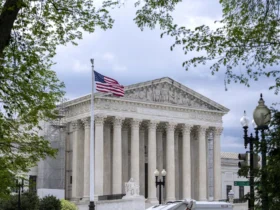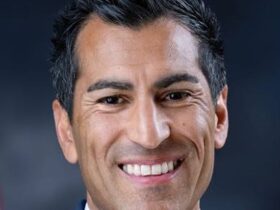According to a new Gallup poll, support for same-sex marriage among Republicans has dropped 14 percentage points in the past three years. Support now stands at 41% within the GOP, and 68% overall. Gay marriage is still popular, though perhaps not as popular as one might be led to believe.
The left will tell you that reactionary conservatives are increasingly bigoted and fascistic in the Age of Donald Trump. But that’s unlikely to be the case. The president, hardly anyone’s idea of a social conservative, has shown no antagonism towards same-sex marriage. It’s been a non-issue.
Moreover, the social conservatives who believed same-sex unions perverted the sanctity of marriage a decade ago with Obergefell v. Hodges, have almost surely continued to hold the same position. Which means it’s more probable that the movement in polls is driven by less religious and more secular types on the right.
I fall under the latter category. After supporting gay marriage in theory throughout the aughts in my columns, I began changing my mind around 10 years ago. And it has very little to do with the question of marriage, per se. Though, that’s not to say there aren’t plenty of important cultural arguments over the role that traditional marriage and sex play in society. A monogamous, lifelong union between one man and one woman — preferably with lots of children — is one of mankind’s best ideas. Whether the legalization of gay marriage undermines that institution is a worthwhile debate.
But the Gallup poll is intentionally simplistic on the question. A person might, for example, support some iteration of same-sex unions for the sake of fairness, and oppose the foundations that gay marriage stands on right now. They may also have noticed that Obergefell has been exploited to destroy religious liberty rights and to drive a far more ambitious and radical agenda.
The late P.J. O’Rourke once joked that if gays “want to get married, have children, and go to church, next they’ll be advocating school vouchers, boycotting HBO, and voting Republican.” That, of course, isn’t the case, at least not for the LGBTQ+ movement, which keeps adding causes to its acronym, which now features a plus sign signifying that it will add new ones in perpetuity.
For many, gay marriage means an incessant cultural overreach. Even the Gallup piece analyzing the drop in support offers an example of why. “During his second term,” Megan Brenan writes, “President Donald Trump has implemented policies that significantly roll back LGBTQ+ protections, particularly affecting transgender individuals. These occurrences suggest that same-sex marriage in the U.S. could face renewed legal and political challenges.” Gay marriage has nothing to do with transgender individuals,” and yet the two are inextricably bound in our debate.
The left insists on conflating the desire of, say, a same-sex couple to enjoy the legal protections of marriage, and the “right” of a child to mutilate themselves or the right of a boy to dominate girls sports or the right to have sexually explicit books in elementary school libraries. It is not the least bit surprising that Republicans who were once willing to support or surrender on the idea of same-sex unions” now — correctly — believe that LGBTQ+ “rights” are just a shorthand for ever-expanding menu of radical policies. It is difficult to ignore that the professional gay activist class is endlessly aligning itself with every violent far-left cultural movement that comes along, from Black Lives Matter to “Palestine.”
That’s not the biggest problem, though. Obergefell’ is a unilateral attack on religious liberty, a genuine natural right that is explicitly laid out in the constitution. If religious freedom can’t survive gay marriage, then the latter shouldn’t exist.
In his prescient dissent, Justice Clarence Thomas warned that it was “inevitable” religious freedom and the Obergefell decision would “come into conflict, particularly as individuals and churches are confronted with demands to participate in and endorse civil marriages between same-sex couples.” It happened almost right away. And it often seemed like the conflict was the point.
Did most Americans who vaguely support gay marriage believe it would empower the state to compel cakemakers and web designers and florists to participate in the gay wedding ceremonies or lose their businesses? The authoritarian persecution of Jack Phillips was perhaps the most dramatic example of the state prosecuting a citizen for a thought crime in a long time. But it wasn’t just about Phillips. The Colorado Civil Rights Commission, whose members literally accused the cakemaker of acting like a Nazi and a slaveholder, was a warning. It took around a decade before the Supreme Court finally, and tepidly, intervened on Phillips’s behalf, without definitively upholding religious liberty or free expression rights, which includes not saying things you don’t believe. The notion of equality had morphed into a ‘right’ to compel others to serve your political needs.
Did most Americans who favor gay marriage support mandating that Catholic adoption agencies work with same-sex couples, forcing them to undermine centuries-old beliefs regarding marriage or go out of business? Doubtful. Catholics, who had been placing children successfully for decades, were compelled to shut down their services.
If you don’t believe the union of a man and woman is a sacrament or unique, that’s your right. But Obergefell cooked up the right to same same-sex marriage for the first time. As John Roberts noted in his dissent, “freedom to exercise religion is—unlike the right imagined by the majority—actually spelled out in the Constitution.” Religious freedom is, as Roberts wrote, “ominously” unmentioned in the majority decision.
Sooner or later, the court will have to offer a narrower decision on the matter of same-sex marriage, or the First Amendment won’t mean anything.
Now, I realize it’s rare that anyone ponders SCOTUS decisions in neutral legal terms rather than through a political prism. Wherever you stand on the issue, Obergefell, like Roe, created a “right” out of the ether when the issue belongs in the hands of voters and state legislatures to debate and then craft law that balance these interests. There is nothing unconstitutional about creating a new category of marriage. But you have no “right” to one, either. Some issues are meant for democracy and others aren’t, and we keep confusing them.
NO ONE CARES ABOUT THE DEBT ANYMORE
When I first began writing about gay marriage, one of the solutions that was bandied about — one advocated for by libertarians and liberals like Michael Kinsley — was to extricate marriage from state control altogether. Form your own relationships and marry (or not) in whatever church (or not) you desire. Sign contracts to define the legal parameters of your association. Call it what you like. Not exactly romantic. And not exactly practical when we consider the legal complexities of civil marriage and its significance in society. But no one was interested, anyway.
Social conservatives never warmed to libertarian notions of state neutrality on moral grounds. The left hated it, because the point of the movement was to give state sanction to gay marriage and force to get everyone with the program. This is no better for traditionalists. Obergefell was a disaster from the start. And perhaps more people are now beginning to see the disastrous decision for what it was.
















Leave a Reply